初中英语 江苏专版牛津译林九年级上册 Unit 4 知识点总结
江苏专版牛津译林九年级上册 Unit 4 知识点总结
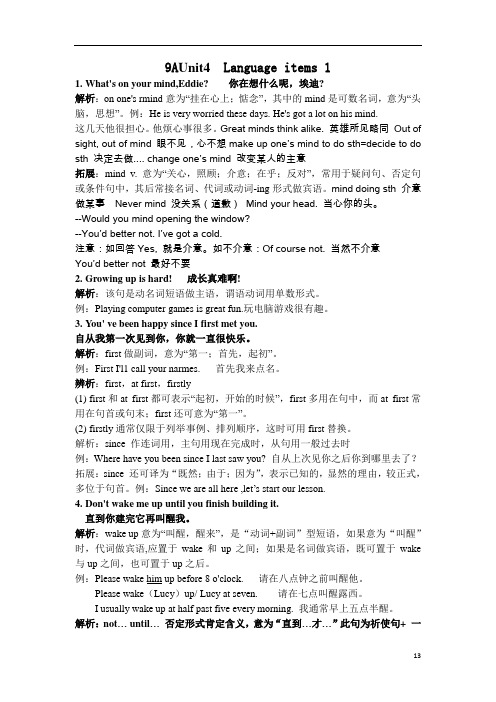
9A Unit4 Language items 11.What's on your mind,Eddie? 你在想什么呢,埃迪?解析:on one's rmind意为“挂在心上;惦念”,其中的mind是可数名词,意为“头脑,思想”。
例:He is very worried these days. He's got a lot on his mind.这几天他很担心。
他烦心事很多。
Great minds think alike. 英雄所见略同Out of sight, out of mind 眼不见,心不想make up one’s mind to do sth=decide to do sth 决定去做.... change one’s mind 改变某人的主意拓展:mind v. 意为“关心,照顾;介意;在乎;反对”,常用于疑问句、否定句或条件句中,其后常接名词、代词或动词-ing形式做宾语。
mind doing sth 介意做某事Never mind 没关系(道歉)Mind your head. 当心你的头。
--Would you mind opening the window?--You’d better not. I’ve got a cold.注意:如回答Yes, 就是介意。
如不介意:Of course not. 当然不介意You’d better not 最好不要2.Growing up is hard! 成长真难啊!解析:该句是动名词短语做主语,谓语动词用单数形式。
例:Playing computer games is great fun.玩电脑游戏很有趣。
3.You' ve been happy since I first met you.自从我第一次见到你,你就一直很快乐。
解析:first做副词,意为“第一;首先,起初”。
例:First I'l1 call your narmes. 首先我来点名。
牛津译林版英语九年级上册(初三上期)Unit4Growingup知识归纳与拓展
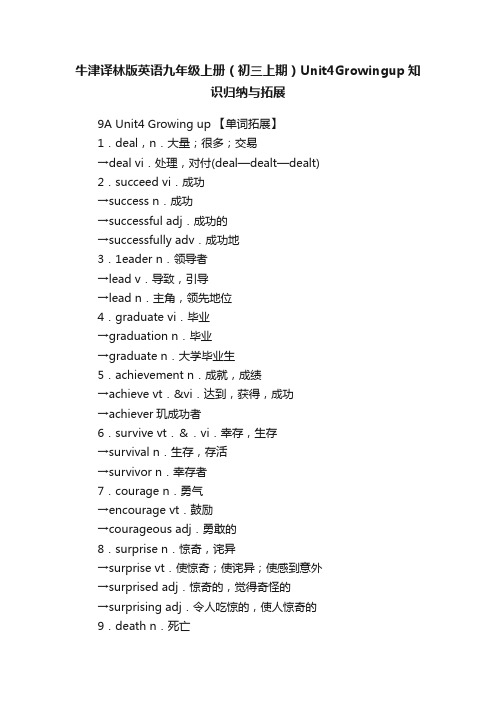
牛津译林版英语九年级上册(初三上期)Unit4Growingup知识归纳与拓展9A Unit4 Growing up 【单词拓展】1.deal,n.大量;很多;交易→deal vi.处理,对付(deal—dealt—dealt)2.succeed vi.成功→success n.成功→successful adj.成功的→successfully adv.成功地3.1eader n.领导者→lead v.导致,引导→lead n.主角,领先地位4.graduate vi.毕业→graduation n.毕业→graduate n.大学毕业生5.achievement n.成就,成绩→achieve vt.&vi.达到,获得,成功→achiever玑成功者6.survive vt.&.vi.幸存,生存→survival n.生存,存活→survivor n.幸存者7.courage n.勇气→encourage vt.鼓励→courageous adj.勇敢的8.surprise n.惊奇,诧异→surprise vt.使惊奇;使诧异;使感到意外→surprised adj.惊奇的,觉得奇怪的→surprising adj.令人吃惊的,使人惊奇的9.death n.死亡→die u.死,死亡→dead adj.死的→dying adj.临终的,垂死的【短语归纳】1.on your mind挂在你心上2.a great deal of information大量信息3.through the Internet通过网络4.much smaller than the other kids 比其他孩子小很多5.try out for the school team参加校队的选拔6.succeed in getting a scholarship 成功获得奖学金7.take notice of him注意到他8.graduate from high school从高中毕业9.lose their lives during the war 在战争中失去他们的生命10.be forced to move to another country 被迫移居到另外一个国家11.have her diary published(请人)出版她的日记12.admire them for their courage 因为他们的勇气佩服他们13.survive the war在战争中存活下来14.come across new words遇到生词15.in his fifties在他五十几岁时16.have some money left有些剩余的钱【句型分析】1.Do n’t wake me up until you finish building it.(P48)until,till都可以表示“一直到……为止”,引导时间状语从句,表示动作、状态的持续,常与延续性动词连用。
牛津译林九年级上学期英语知识点汇总-Unit4
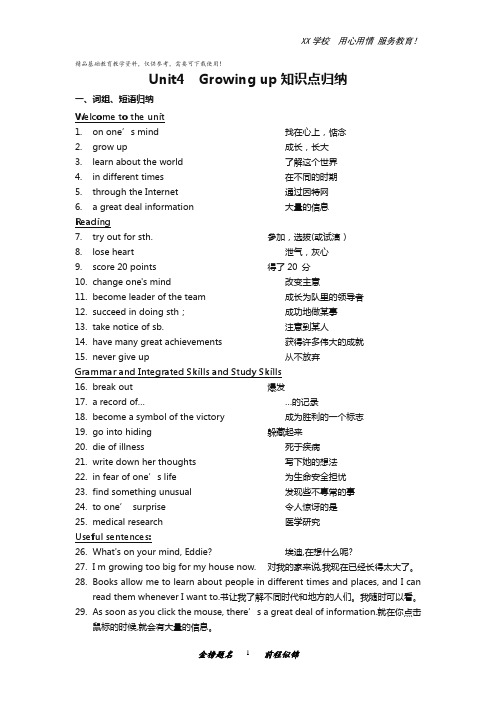
精品基础教育教学资料,仅供参考,需要可下载使用!Unit4 Growing up知识点归纳一、词组、短语归纳Welcome to the unit1.on one’s mind 找在心上,惦念2.grow up 成长,长大3.learn about the world 了解这个世界4.in different times 在不同的时期5.through the Internet 通过因特网6. a great deal information 大量的信息Reading7.try out for sth. 參加,选拔(或试演)8.lose heart 泄气,灰心9.score 20 points 得了20 分10.change one's mind 改变主意11.become leader of the team 成长为队里的领导者12.succeed in doing sth;成功地做某事13.take notice of sb. 注意到某人14.have many great achievements 获得许多伟大的成就15.never give up 从不放弃Grammar and Integrated Skills and Study Skills16.break out 爆发17.a record of……的记录18.become a symbol of the victory 成为胜利的一个标志19.go into hiding 躲藏起来20.die of illness 死于疾病21.write down her thoughts 写下她的想法22.in fear of one’s life 为生命安全担忧23.find something unusual 发现些不專常的事24.to one’surprise 令人惊讶的是25.medical research 医学研究Useful sentences:26.What's on your mind, Eddie? 埃迪,在想什么呢?27.I m growing too big for my house now. 对我的家来说,我现在已经长得太大了。
牛津译林版英语九年级上册第四单元词组总结

牛津译林版英语九年级上册第四单元词组总结Unit4 growing up短语1、惦念,使担忧on one’s mind2、怎么了?(3种)What’s up? / What’s wrong? / What’s the matter?3、不用谢,别客气That’s all right. / That’s OK./ You’re welcome . / Not at all. /Don’t mention it.4、没关系,不要紧That’s all right. / Never mind . / It doesn’t matter.5、醒来/ 唤醒某人wake up / wake sb. up6、我喜欢通过旅行来了解世界。
I like to learn about the world throughtraveling.7、用那种方式去了解世界learn (about the world) that way8、在不同的时代和地方in different times and places9、大量的信息/ 从网络中学到许多a great deal of information / learn a greatdeal through the Internet10、在就读初中期间/ 在高中while attending junior high / in senior high11、参加校队/ 奥运会的选拔try out for the school team / the Olympic Games12、拒绝做某事refuse to do sth.13、灰心,失去信心lose (one’s) heart14、最后得分/ 得了20分the final score / score 20 points15、从那时起from then on16、由于身高坐在看台上sit in the stands because of his height17、使/让某人做某事(3种)make / have sb. do sth. / get sb. to do sth.18、让教练改变了他的想法get the coach to change his mind19、继续做同一件事go on (continue) doing sth.20、接着做另一件事go on (continue) to do sth.21、接着成为了球队的队长go on to become leader of the team22、被命名为年度最佳球员be named Player of the Year23、以……的名字命名name after……24、邀请他在专科院校打球invite him to play at a junior college25、带领他的队伍走向了全国冠军lead his team to the national championship26、让……引起某人的注意bring …..to the attention of sb.27、结果,所以/ 由于…… as a result / as a result of……28、注意到……/ 注意某人做某事/ 注意某人正在做某事take noticeof …….. / notice sb. do sth. / notice sb. doing sth.29、获得许多伟大的成就have (get) many great achievements30、他最引以为豪的一刻the proudest moment31、成功地得到了奖学金succeed in getting a scholarship32、大学毕业graduate from the university33、强迫某人做某事force sb. to do sth34、他被迫在另一个篮球队打球。
牛津译林版九年级英语上册Unit4知识点
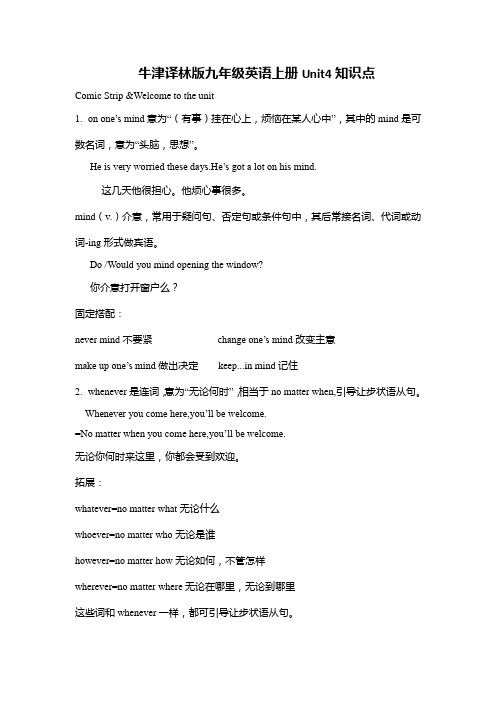
牛津译林版九年级英语上册Unit4知识点Comic Strip &Welcome to the unit1.on one’s mind意为“(有事)挂在心上,烦恼在某人心中”,其中的mind是可数名词,意为“头脑,思想”。
He is very worried these days.He’s got a lot on his mind.这几天他很担心。
他烦心事很多。
mind(v.)介意,常用于疑问句、否定句或条件句中,其后常接名词、代词或动词-ing形式做宾语。
Do /Would you mind opening the window?你介意打开窗户么?固定搭配:never mind不要紧change one’s mind改变主意make up one’s mind做出决定keep...in mind记住2.whenever是连词,意为“无论何时”,相当于no matter when,引导让步状语从句。
Whenever you come here,you’ll be welcome.=No matter when you come her e,you’ll be welcome.无论你何时来这里,你都会受到欢迎。
拓展:whatever=no matter what无论什么whoever=no matter who无论是谁however=no matter how无论如何,不管怎样wherever=no matter where无论在哪里,无论到哪里这些词和whenever一样,都可引导让步状语从句。
3.through是介词,意为“以;凭借”,表示做某事的方式,相当于by.We got the news through our friend.我们通过朋友得到这个消息。
辨析:through/by,with,inThrough (prep.)表示空间上的通过,穿过。
辨析:cross/across/through/over4.as soon as意为“一...就...”,引导时间状语从句。
牛津译林版英语九年级上册第四单元知识点

九年级上册Unit4 growing up单词1.time n.时期,时代【例】The movie is set during the time of the Russian revolution.这部电影以俄国革命时期为背景。
注意:time作“时期,时代”讲时,经常用其复数形式。
ancient times古代people in different times and places不同时代和不同地方的人【拓展】time n.时间;次数2. whenever conj. 无论何时【例】You can go there whenever you want.无论你什么时候想去那里都可以。
注意:whenever相当于no matter when。
【拓展】whenever adv.究竟什么时候Whenever will you tell us the truth? 你到底什么时候告诉我们真相? 3.through prep.以,凭借【例】:She got her first job through an employment agency.她通过职业介绍所找到了她的第份工作。
through prep.穿过The sun shone through the window.太阳透过窗户照进来。
4.deal n.很多【例】In addition to leaves, these animals eat a great deal of fruit.除了树叶之外,这些动物还吃大量的水果。
a great deal (of)大量,许多注意:a great deal of后接不可数名词。
5.score v.得分【例】Our team scored five points. 我们队得了五分。
【拓展】score n.分数,成绩Mr Wang, could you tell me where I can find out the exam scores?王老师,你能告诉我在哪里能查出考试成绩吗?6. university n.大学【例】go to university上大学Is there a university in this city?这座城市有大学吗?注意:表示“上大学,读大学”时,university前通常不加冠词。
牛津译林版-英语-九上-牛津译林版九上英语 4单元 Growing up 知识点小结
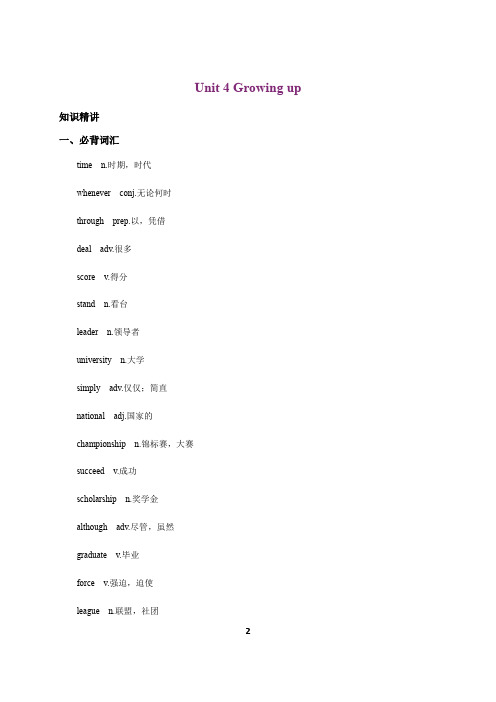
Unit 4 Growing up 知识精讲一、必背词汇time n.时期,时代whenever conj.无论何时through prep.以,凭借deal adv.很多score v.得分stand n.看台leader n.领导者university n.大学simply adv.仅仅;简直national adj.国家的championship n.锦标赛,大赛succeed v.成功scholarship n.奖学金although adv.尽管,虽然graduate v.毕业force v.强迫,迫使league n.联盟,社团2remain v.逗留;保持不变prove v.证明matter v.要紧,有重大影响medal n.奖牌,奖章career n.生涯,职业against prep.与…相反record n.记录symbol n.象征victory n.胜利spirit n.幽灵;精神;灵魂unusual adj.不寻常的,不平常的cell n.细胞cancer n.癌症surprise n.惊奇,诧异research n.研究;调查death n.死,死亡2二、重点词汇1. simply adv.1). completely or as much as possible完全地;绝对地例句:You look simply (= really) beautiful in that dress.你穿那条裙子看上去真漂亮。
2). only仅仅;只不过例句:I don't like my job - I simply do it for the money.我不喜欢自己的工作——我纯粹是为了钱才干的。
2. force v.1). to make something happen or make someone do something difficult, unpleasant, orunusual, especially by threatening or not offering the possibility of choice强迫,迫使例句:I really have to force myself to be nice to him.我确实得要强迫自己才能做到对他和颜悦色。
牛津英语译林版九年级上册 9A Unit4 知识点归纳总结
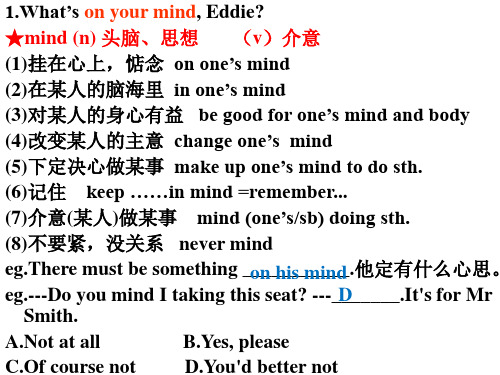
★7.through (prep) 以、凭借 后接名词或代词
(prep) 穿过
穿过 through the city/ the tunnel/ the clouds/ the forest/the
door/the window/ the hole
China. eg.上海比日本的城市大。
Shanghai is bigger than all the cities/any city in Japan.
3. While attending junior high, Spud tried out for the
school team, but he was rufused at first... (1) attend junior high 上初中 attend 参加,出席
attend a meeting/a wedding/a class/a lesson/a report/school join 参加组织 =be in/a member of... join a club/a team/a group/the Party党/a trip/the army
join sb/join sb in doing take part in= join in 参加活动 (+activities/a party) ★(2) try out for sth 参加……选拔(或试演)
D.through, by
★8.As soon as you click the mouse, there’s a great deal of information.
(1) as soon as 一……就,引导时间状语从句。主句是一 般将来时,则从句常用一般现在时,主句过去时,从句 也用过去时。
初中英语 江苏专版牛津译林九年级上册 Unit 4 知识点总结
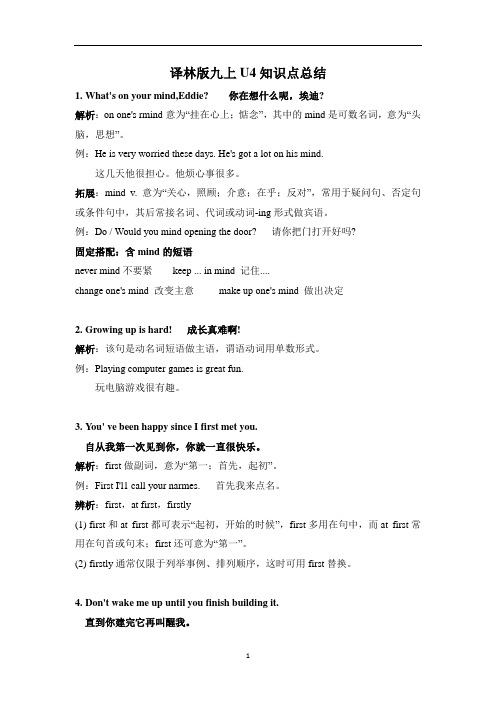
译林版九上U4知识点总结1.What's on your mind,Eddie? 你在想什么呢,埃迪?解析:on one's rmind意为“挂在心上;惦念”,其中的mind是可数名词,意为“头脑,思想”。
例:He is very worried these days. He's got a lot on his mind.这几天他很担心。
他烦心事很多。
拓展:mind v. 意为“关心,照顾;介意;在乎;反对”,常用于疑问句、否定句或条件句中,其后常接名词、代词或动词-ing形式做宾语。
例:Do / Would you mind opening the door? 请你把门打开好吗?固定搭配:含mind的短语never mind不要紧keep ... in mind 记住....change one's mind 改变主意make up one's mind 做出决定2.Growing up is hard! 成长真难啊!解析:该句是动名词短语做主语,谓语动词用单数形式。
例:Playing computer games is great fun.玩电脑游戏很有趣。
3.You' ve been happy since I first met you.自从我第一次见到你,你就一直很快乐。
解析:first做副词,意为“第一;首先,起初”。
例:First I'l1 call your narmes. 首先我来点名。
辨析:first,at first,firstly(1)first和at first都可表示“起初,开始的时候”,first多用在句中,而at first常用在句首或句末;first还可意为“第一”。
(2)firstly通常仅限于列举事例、排列顺序,这时可用first替换。
4.Don't wake me up until you finish building it.直到你建完它再叫醒我。
牛津译林版九年级英语上册Unit4 Growing up 单元知识梳理
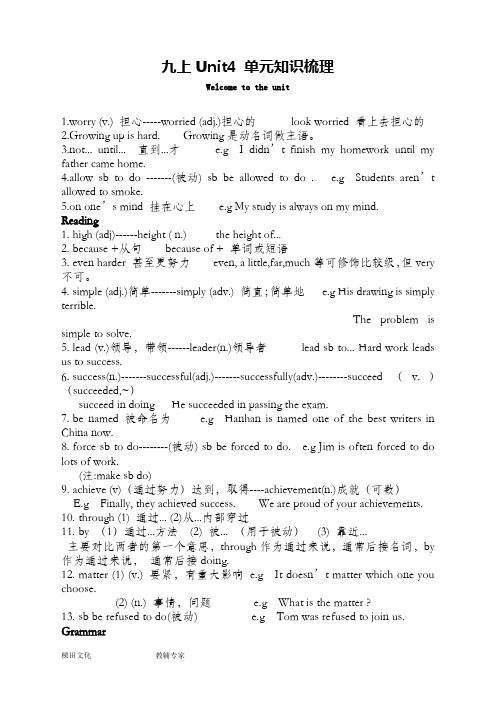
九上Unit4 单元知识梳理Welcome to the unit1.worry (v.) 担心-----worried (adj.)担心的look worried 看上去担心的2.Growing up is hard. Growing是动名词做主语。
3.not... until... 直到...才 e.g I didn’t finish my homework until my father came home.4.allow sb to do -------(被动) sb be allowed to do . e.g Students aren’t allowed to smoke.5.o n one’s mind 挂在心上 e.g My study is always on my mind.Reading1.high (adj)------height ( n.) the height of...2.because +从句because of + 单词或短语3.even harder 甚至更努力even, a little,far,much等可修饰比较级,但very 不可。
4.simple (adj.)简单-------simply (adv.) 简直;简单地 e.g His drawing is simply terrible.The problem is simple to solve.5.lead (v.)领导,带领------leader(n.)领导者lead sb to... Hard work leads us to success.6.success(n.)-------successful(adj.)-------successfully(adv.)--------succeed(v.)(succeeded,~)succeed in doing He succeeded in passing the exam.7.be named 被命名为 e.g Hanhan is named one of the best writers in China now.8.force sb to do--------(被动) sb be forced to do. e.g Jim is often forced to do lots of work.(注:make sb do)9.achieve (v)(通过努力)达到,取得----achievement(n.)成就(可数)E.g Finally, they achieved success. We are proud of your achievements.10.through (1) 通过... (2)从...内部穿过11.by (1)通过...方法(2) 被... (用于被动)(3) 靠近...主要对比两者的第一个意思,through作为通过来说,通常后接名词,by 作为通过来说,通常后接doing.12.matter (1) (v.) 要紧,有重大影响e.g It doesn’t matter which one you choose.(2) (n.) 事情,问题 e.g What is the matter ?13.sb be refused to do(被动) e.g Tom was refused to join us. Grammar1. before, after 的用法(1) before “在…之前”,表示主句动作发生在从句动作之前。
牛津译林版-英语-九上-4单元 Growing up Integrated skills 知识点
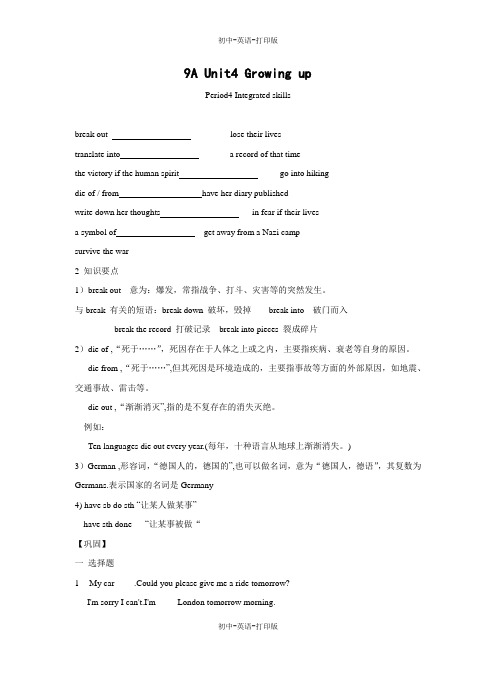
9A Unit4 Growing upPeriod4 Integrated skillsbreak out lose their livestranslate into a record of that timethe victory if the human spirit go into hikingdie of / from have her diary publishedwrite down her thoughts in fear if their livesa symbol of get away from a Nazi campsurvive the war2 知识要点1)break out 意为:爆发,常指战争、打斗、灾害等的突然发生。
与break 有关的短语:break down 破坏,毁掉break into 破门而入break the record 打破记录break into pieces 裂成碎片2)die of ,“死于……”,死因存在于人体之上或之内,主要指疾病、衰老等自身的原因。
die from ,“死于……”,但其死因是环境造成的,主要指事故等方面的外部原因,如地震、交通事故、雷击等。
die out ,“渐渐消灭”,指的是不复存在的消失灭绝。
例如:Ten languages die out every year.(每年,十种语言从地球上渐渐消失。
)3)German ,形容词,“德国人的,德国的”,也可以做名词,意为“德国人,德语”,其复数为Germans.表示国家的名词是Germany4) have sb do sth “让某人做某事”have sth done “让某事被做“【巩固】一选择题1 -- My car ____.Could you please give me a ride tomorrow?-- I'm sorry I can't.I'm ____ London tomorrow morning.A.is new,leavingB.has borken down,leaving forC.broke,leaving forD.is expensive,leaving2 ----Do you know that Mr Zhang passed last eek?----Yes. He died illness.A away, ofB on ,fromC by ,witD off,as3 I saw some and dancing in the street the day before yesterdayA Germen; EnglishmenB Germans ; EnglishmansC Germans; Englishmen4 He wants to have his TVA repairingB repairedC to repairPeriod 5 Taskin one’s fifties donate bloodto one’s surprise medical researchhave a heart full of loveYou will not find anything unusual about him until you learn more.Whenever he has some money left, he gives it to someone in need.When I was a little girl, I could not understand why my father always seemed to be kind to others than to his own family1 in one’s +整十的数词的复数,表示处于相应的年龄段,例如:in one’s twenties 在某人二十几的时候in the +整十的数词的复数,表示在某个年代,例如:in the seventies 在七十年代2 to one’s surprise 意为:使……惊讶in surprise 意为:惊奇地形容词为surprising ,常用来修饰物;surprised ,常用来修饰人。
牛津译林版英语九年级上册Unit 4 重难点知识归纳总结
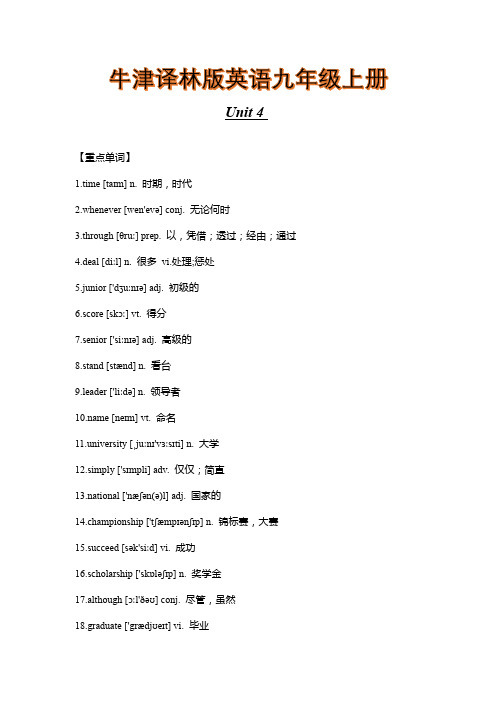
【重点单词】1.time [taɪm] n. 时期,时代2.whenever [wen'evə] conj. 无论何时3.through [θruː] prep. 以,凭借;透过;经由;通过4.deal [diːl] n. 很多vi.处理;惩处5.junior ['dʒuːnɪə] adj. 初级的6.score [skɔː] vt. 得分7.senior ['siːnɪə] adj. 高级的8.stand [stænd] n. 看台9.leader ['liːdə] n. 领导者 [neɪm] vt. 命名11.university [ˌjuːnɪ'vɜːsɪti] n. 大学12.simply ['sɪmpli] adv. 仅仅;简直13.national ['næʃən(ə)l] adj. 国家的14.championship ['tʃæmpɪənʃɪp] n. 锦标赛,大赛15.succeed [sək'siːd] vi. 成功16.scholarship ['skɒləʃɪp] n. 奖学金17.although [ɔːl'ðəʊ] conj. 尽管,虽然18.graduate ['grædjʊeɪt] vi. 毕业19.force [fɔːs] vt. 强迫,迫使20.league [liːɡ] n. 联盟,社团21.remain [rɪ'meɪn] vi. 逗留;保持不变22.achievement [ə'tʃiːvmənt] n. 成就,成绩23.prove [pruːv] vt. 证明24.matter ['mætə] v. 要紧,有重大影响,有关系25.record ['rekɔːd] n. 记录26.symbol ['sɪmb(ə)l] n. 象征27.victory ['vɪktəri] n. 胜利28.spirit ['spɪrɪt] n. 精神;幽灵;灵魂29.German ['dʒɜːmən] adj. 德国(人)的30.thought [θɔːt] n. 想法,看法,主意31.survive [sə'vaɪv] vt.&vi. 幸存,生存32.admire [əd'maɪə] vt. 钦佩,羡慕33.courage ['kʌrɪdʒ] n. 勇气34.unusual [ʌn'juːʒʊəl] adj. 不寻常的35.cell [sel] n. 细胞36.cancer ['kænsə] n. 癌症37.surprise [sə'praɪz] n. 惊奇,诧异38.research [rɪ'sɜːtʃ] n. 研究;调查39.death [deθ] n. 死,死亡【重点短语】1. on one’s mind 惦念2. not...until 直到……才3. people in different times and places 不同时期不同地方的人4. a great deal of information大量的信息5. attend junior high 上初中6. be refused to do sth. 被拒绝做某事7. lose heart失去信心8. from then on 从那时起9. change one’s mind改变主意10. decide to do sth. 决定做某事11. succeed in doing sth. 成功地做某事12. be forced to do sth. 被迫去做某事13. take notice of sb. 关注/注意到某人14. give up放弃15. feel tired out 感到筋疲力尽16. be crazy about痴迷于17. break out爆发18. have her diary published使她的日记被出版19. write down her thoughts写下她的想法20. get away from 从……逃离21. survive the war在战争中幸存22. admire sb. for sth. 因为某事而钦佩某人23. live in peace生活在和平中24. come across偶遇25. to one’s surprise令某人惊奇的是26. be kind to sb. 对某人友好【重点句型】1.What’s on your mind?你在想什么呢?2.You’ve been happy since I first met you.自从我第一次见到你,你就一直很快乐。
牛津译林版英语九年级上册 Unit 4 Do it yourself知识点总结(无答案)

Unit4Key points1.What’s on your mind, Eddie?在想啥呢,埃迪?On one’s mind (有事)挂在心上;惦念My health is always on my mother’s mind.妈妈总把我的健康挂在心上。
2.What’s up? 怎么了?;出什么事了? 是口语中常见的一个句式,用来询问对方的状况,相当于what’s wrong?/what’s the matter?/what’s the trouble?/what’s happening?/what has happened?那两个女孩怎么了?3.我直到亲眼看见他,亲自听见他说才能完全相信它。
I ,but he didn’t come.我一直等到3点钟,但他没有来。
4.Life is a journey.生命是一次旅行。
Journey 旅行;旅游尤指长途旅行咱们去旅行。
Let’s .我们要去一个陌生国家旅游。
We a strange country.口诀:长途陆路用journey,短途短期用trip;观光游玩用tour,时长路远用travel。
5.I can read them whenever I want to. whenever为连词Whenever 相当于你不论什么时候来,都是受欢迎的。
,you are welcome.每当我们见到他时,我们都跟他说话。
,we speak to him.Students can ask for help (无论何时)they need it at school.拓展:Wherever =no matter whereHowever=no matter howWhoever=no matter whoWhatever=no matter what6.As soon as you click the mouse, there’s a great deal of information.你一点击鼠标就有大量的信息。
牛津译林版-英语-九上-4单元GrowingupGrammar知识点

牛津译林版-英语-九上-4单元GrowingupGrammar知识点9A Unit4 Growing upPeriod3 Grammar1.before表示“在……之前”,after表示“在……之后”,两个词后面可接一个具体的时间点,也可以接一个句子,构成时间状语从句。
例如:1.The sun came out the storm stopped.2.Close the window you leave the room , please.2. when 意为“当……的时候”;“在……的时候”关于含when的复合句的时态的确定3 while表示“当……的时候,和……同时”,引导时间状语从句,常常采用进行时态。
例如:While I was watching TV, the doorbell rang.(我看电视时,门铃响了)While my mother was cooking, my father was watching TV(当我妈妈在做饭时,我爸爸在看电视)4 when 与while 的区别注意:如果从句动作和主句动作同时发生,并且从句动作为延续性动词时,when,while可以互换使用5. when ,while 引导时间状语从句,当主句与从句时态一致时,从句中出现的主语与be动词可以省略构成when/while + -ing结构。
e.g. : When (she is ) in trouble , she always asks for my help.While (I am ) travelling , I like to buy some souvenirs.【巩固】一在下列各句的空格中填入适当的连词1._________ he comes tomorrow, I shall ask where he has been.2._________ he was speaking, everybody listened carefully.3.I saw her just _________ she was getting off the train.4.Have a good look at that man _________ you pass him.5.It was already eight o'clock _________ we got there.1.由since引导的时间状语从句。
新牛津译林版九年级英语上册Unit4知识点短语复习总结
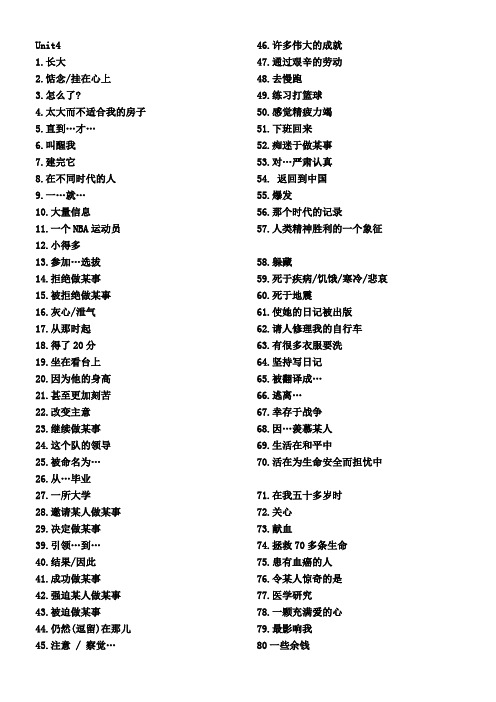
Unit41.长大2.惦念/挂在心上3.怎么了?4.太大而不适合我的房子5.直到…才…6.叫醒我7.建完它8.在不同时代的人9.一…就…10.大量信息11.一个NBA运动员12.小得多13.参加…选拔14.拒绝做某事15.被拒绝做某事16.灰心/泄气17.从那时起18.得了20分19.坐在看台上20.因为他的身高21.甚至更加刻苦22.改变主意23.继续做某事24.这个队的领导25.被命名为…26.从…毕业27.一所大学28.邀请某人做某事29.决定做某事39.引领…到…40.结果/因此41.成功做某事42.强迫某人做某事43.被迫做某事44.仍然(逗留)在那儿45.注意 / 察觉…46.许多伟大的成就47.通过艰辛的劳动48.去慢跑49.练习打篮球50.感觉精疲力竭51.下班回来52.痴迷于做某事53.对…严肃认真54. 返回到中国55.爆发56.那个时代的记录57.人类精神胜利的一个象征58.躲藏59.死于疾病/饥饿/寒冷/悲哀60.死于地震61.使她的日记被出版62.请人修理我的自行车63.有很多衣服要洗64.坚持写日记65.被翻译成…66.逃离…67.幸存于战争68.因…羡慕某人69.生活在和平中70.活在为生命安全而担忧中71.在我五十多岁时72.关心73.献血74.拯救70多条生命75.患有血癌的人76.令某人惊奇的是77.医学研究78.一颗充满爱的心79.最影响我80一些余钱姓名第4单元知识点复习长大grow up2.惦念/挂在心上on one’s mind3.怎么了? What’s up / wrong (with you)?4.太大而不适合我的房子too big for my house5.直到…才… not …until…6.叫醒我wake me up7.建完它finish building it8.在不同时代的人people in different times9.一…就… as soon as10.大量信息a great deal of information一个NBA运动员an NBA player12.小得多much smaller13.参加…选拔try out for14.拒绝做某事refuse to do sth.15.被拒绝做某事be refused to do sth.16.灰心/泄气lose heart / lose one’s heart17.从那时起from then on18.得了20分score 20 points19.坐在看台上sit in the stands20.因为他的身高because of his height21.甚至更加刻苦even harder22.改变主意change one’s mind23.继续做某事go on to do sth.24.这个队的领导leader of the team25.被命名为…be named …26.从…毕业/ 毕业于graduate from…27.一所大学 a university28.邀请某人做某事invite sb. to do sth.29.决定做某事decide to do sth.39.引领…到…lead.. to…(lead过去式—led)40.结果/因此as a result41.成功做某事succeed in doing sth.42.强迫某人做某事force sb. to do sth.43.被迫做某事be forced to do sth.44.仍然(逗留)在那儿remain there45.注意/ 察觉…take notice of…46.许多伟大的成就many great achievements47.通过艰辛的劳动through hard work/跑步go jogging / running49.练习打篮球practice playing basketball 50.感觉精疲力竭feel tired out (feel过去式-felt)51.下班回来come back from work52.痴迷于做某事be crazy about doing sth.53.对…严肃认真be / become serious about…54. 返回到中国return to Chinabreak out (break-broke-broken)56.那个时代的记录a record of that time57.人类精神胜利的一个象征a symbol of the victory of the human spirit58.躲藏go into hiding59.死于疾病/饥饿/寒冷/悲哀die of illness / hunger / cold / sadness60.死于地震/车祸die from the earthquake / the car accident61.使她的日记被出版have her diary published62.请人修理我的自行车have my bike repaired63.有很多衣服要洗have many clothes to wash64.坚持写日记keep writing in a / one’s diary65.被翻译成…be translated into…66.逃离…get away from…67.幸存于战争survive the war68.因…羡慕某人admire sb. for …69.生活在和平中live in peace70.活在为生命安全而担忧中live in fear of one’s life71.一个12岁的男孩 a 12-year-old boy72.第二次世界大战World War II73. 就像…just like+短语/doing sth. just as+句子in one’s fifties75.关心care for76.献血donate blood77.拯救70多条生命save over 70 lives78.患血癌的人people with blood cancer79.令某人惊奇/高兴的是to one’s surprise / joy80.医学研究medical research81.一颗充满爱的心 a heart full of love82.最影响我influence me most83.有一些余钱have some money left (剩余的)84.在需要中的人people in need85.在他死后after his death86.付得起做某事/某物的钱afford to do sth./ sth.87.看起来…seem to be +adj.。
牛津译林版九年级英语上册Unit-4单元知识点归纳总结
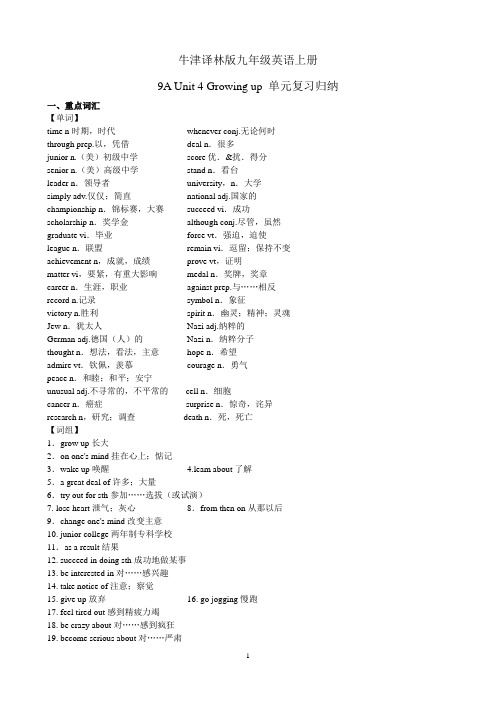
牛津译林版九年级英语上册9A Unit 4 Growing up 单元复习归纳一、重点词汇【单词】time n时期,时代whenever conj.无论何时through prep.以,凭借deal n.很多junior n.(美)初级中学score优.&扰.得分senior n.(美)高级中学stand n.看台leader n.领导者university,n.大学simply adv.仅仅;简直national adj.国家的championship n.锦标赛,大赛succeed vi.成功scholarship n.奖学金although conj.尽管,虽然graduate vi.毕业force vt.强迫,迫使league n.联盟remain vi.逗留;保持不变achievement n,成就,成绩prove vt,证明matter vi,要紧,有重大影响medal n.奖牌,奖章career n.生涯,职业against prep.与……相反record n.记录symbol n.象征victory n.胜利spirit n.幽灵;精神;灵魂Jew n.犹太人Nazi adj.纳粹的German adj.德国(人)的Nazi n.纳粹分子thought n.想法,看法,主意hope n.希望admire vt.钦佩,羡慕courage n.勇气peace n.和睦;和平;安宁unusual adj.不寻常的,不平常的cell n.细胞cancer n.癌症surprise n.惊奇,诧异research n,研究;调查death n.死,死亡【词组】1.grow up长大2.on one's mind挂在心上;惦记3.wake up唤醒 4.leam about了解5.a great deal of许多;大量6.try out for sth参加……选拔(或试演)7. lose heart泄气;灰心8.from then on从那以后9.change one's mind改变主意10. junior college两年制专科学校11.as a result结果12. succeed in doing sth成功地做某事13. be interested in对……感兴趣14. take notice of注意;察觉15. give up放弃16. go jogging慢跑17. feel tired out感到精疲力竭18. be crazy about对……感到疯狂19. become serious about对……严肃20. take part in参加21. break out爆发22. because of因为23. lose one's life失去生命24. translate into翻译25. all over the world全世界26.die of/from死于27. write down写下28. in fear of his life为生命安全担忧29. to one's surprise令某人惊奇的是30. in one's fifties在某人五十几岁时31. be willing to乐意做某事32. in need需要33. donate to捐赠二、重要句型1.Books allow me to learn about people in different times and places, and I can read them whenever I want to.书籍允许我去了解不同时代和不同地域的人们,我想要什么时候读就可以什么时候读。
2023-2024学年译林版英语九年级(上)Unit4Growingup知识点

译林版英语九年级(上)Unit4Growing up知识点一.重点词组1.挂在心上;惦记on one’s mind2.在不同时期和地方in different times and places3.一……就……as soon as...4.大量,许多a great deal(of+不可数n.)5.参加……选拔(或试演)try out for sth.6.泄气,灰心lose heart7.拒绝做某事refuse to do sth.8.有/没有做某事的机会get a/the/no chance to do sth.9.从那以后/从现在起from then on/from now on10.使某人做某事get sb.to do sth.11.改变主意change one’s mind12.身高170厘米170cm tall/170cm in height13.让某人引起……的注意bring sb.to the attention of...14.成功地做某事succeed in doing sth.15.注意,觉察……take notice of...16.从……毕业graduate from...17.强迫某人做某事force sb.to do sth.18.对……认真严肃become/be serious about...19.爆发(无被动)break out20.失去生命,丧生lose one’s life21.把……翻译成……translate...into...22.那个时代的记录a record of that time23.人类精神胜利的象征a symbol of the victory of the human spirit 24.躲藏go into hiding25.死于die of/from26.使某事被做have sth.done27.从战争/地震中幸存survive the war/the earthquake 28.钦佩某事物/因某事物而钦佩某人admire sth./admire sb.for sth.29.为生命安全担忧in fear of one’s life30.与……有关relate to...31.……的状态the state of...32.畅销(无被动)sell well33.在某人五十多岁in one’s fifties34.令某人惊奇的是to one’s surprise35.照顾,照料;喜欢,想要carefor二、重点句型1.怎么了?自从我第一次遇见你,你一直都快乐。
牛津译林版九年级英语上册Unit 4 Growing up知识点归纳

9AU4 知识点归纳1. What’s on your mind?on one’s mind 挂在心上,有心事He looks worried. I don’t know what’s on his mind.他看上去很焦虑。
我不知道他有什么心事。
in one’s mind 在某人看来make up one’s mind 下定决心change one’s mind 改变主意2. Growing up is hard!growing up 为动名词短语作主语,谓语动词通常用单数。
Learning English well is very important. 学好英语很重要。
如果主语部分出现两个由and 连接的并列动名词,并且表示同一个意思,谓语动词仍用单数。
Crying and shouting does not help. 哭闹是没用的。
如果不是表示同一件事,谓语动词用复数。
Reading a story and writing a composition are your homework.读一则故事、写一篇作文是你们的回家作业。
grow up 长大Their children have all grown up and left home. 孩子们都已经长大并离开了家。
grow 还可表示“种植,栽培”;作连系动词时,表示“变得”People grow rice in the south. 人们在南方种植水稻。
The girl grew thinner and thinner. 这个女孩变得越来越瘦。
Soon the sky grew light. 不久天空就变亮了。
3. I can read them whenever I want to.whenever 无论何时,每当Whenever I met him, he was always reading a book.每当我看到他,他总是在看书。
苏教译林版初中英语九年级上册 Unit 4 知识汇总
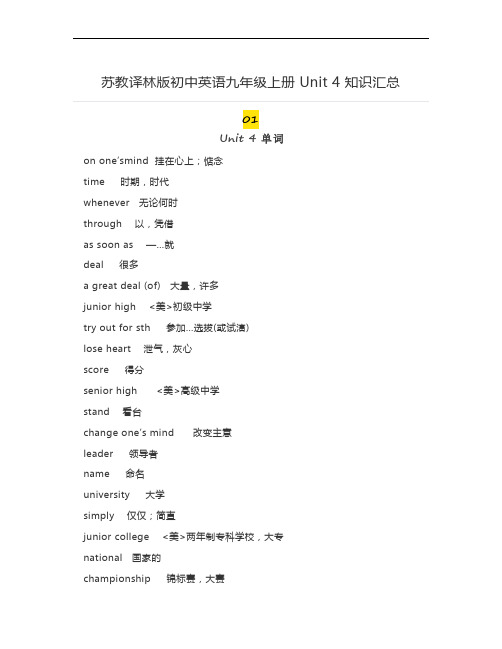
01Unit 4 单词on one’smind 挂在心上;惦念time 时期,时代whenever 无论何时through 以,凭借as soon as —…就deal 很多a great deal (of) 大量,许多junior high <美>初级中学try out for sth 参加…选拔(或试演)lose heart 泄气,灰心score 得分senior high <美>髙级中学stand 看台change one’s mind 改变主意leader 领导者name 命名university 大学simply 仅仅;简直junior college <美>两年制专科学校,大专national 国家的championship 锦标赛,大赛succeed 成功succeed in doing sth 成功地做某事scholarship 奖学金although 尽管,虽然graduate 毕业force 强迫,迫使league 联盟,社团remain 逗留;保持不变take notice of 注意,察觉achievement 成就,成绩prove 证明matter 要紧,有重大影响career 生涯,职业against 对抗;与…相反;违反break out 爆发record 记录symbol 象征victory 胜利spirit 幽灵;精神;灵魂Jew 犹太人go into hiding 躲藏起来Nazi 纳粹的die of/from 死于German 德国(人)的Nazi 纳粹分子Thought 想法,看法,主意survive 幸存;生存Admire 钦佩,羡慕courage 勇气in fear of one’s life 为生命安全担扰unusual 不寻常的,不平常的cell 细胞cancer 癌症surprise 惊奇,诧异to one’ssurprise令某人惊奇的是research 研究;调查death 死,死亡02Unit 4知识梳理【重点短语】1.on one’s mind 惦念2.not...until 直到...才3.learn about the world 了解世界4.through the Internet 通过互联网5.people in different times and places不同时期不同地方的人6.a great deal of information大量的信息7.attend junior high 上初中8.try out for the school team 参加校队选拔9.be refused to do被拒绝去做某事10.lose heart失去信心11.get the chance得到机会12.from then on 从那时起13.the star of the team团队的明星14.because of his height因为身高15.practise even harder练习的更刻苦16.get sb to do让某人做17.change one’s mind改变主意18.go on to do进而去做 ...19.be named Player of the Year 被誉为年度最佳球员20.simply because仅仅因为21.decide to do决定去做某事22.lead sb to带领某人到 ...lead to sth导致…23.the attention of sth ..的关注24.succeed in doing sth成功的做某事25.be forced to do被迫去做某事26.remain there=stay there呆在那27.take notice of sb = pay attention to sb关注(注意)到某人28.give up放弃29.have many great achievements有许多巨大成就30.one’s proudest moment某人的最骄傲的时刻31.through hard work通过艰苦的努力32.size and body type体型33.does not matter无关紧要34.get a scholarship from... …得到奖学金35.an NBA player 一个 NBA 球员36.go jogging去慢跑37.feel tired out 感到筋疲力尽38.receive a call from收到某人的电话39.be crazy about痴迷于40.become serious about sth对..变得认真41.know little English 几乎不懂英语42.end his basketball career结束他的篮球生涯43.break out爆发44.because of the war因为战争45.a record of一个..的记录46.a symbol of 一个..的象征47.the victory of …的胜利48.human spirit 人类精神49.go into hiding 躲藏起来50.die of illness死于疾病内因用 of51.have her diary published使她的日记被出版52.a Nazi camp 一个纳粹集中营53.write down her thoughts写下她的想法54.get away from 从…逃离55.survive the war在战争中幸存56.admire sb for sth因为..而钦佩某人57.a best-seller畅销58.live in peace生活在和平中59.live in fear of their lives 生活在生命安全的恐惧中e across偶遇61.a Jewish girl 一个犹太女孩62.her fear of discovery and death她的被发现和死亡的恐惧63.in his fifties 他五十多岁64.donate blood cells捐献血细胞65.to one’s surprise令某人惊奇的是66.medical research医学研究67.be kind to sb对某人好68.a heart full of love 一个充满爱的心【重点句型】1. The car accident is always on my mind.那次车祸总是挂在我心上.2. I plan to go over my lessons as soon as the film ends.我打算电影一结束就复习功课3. I didn't learn about people in different times until I read the history book.直到读了历史书,我才了解了,不同时期的人们4. Whenever he goes to Suzhou, he will go to visit his grandparents.无论何时他去苏州,他总是去看望他的祖父母5. There is still a great deal of timeleft.还有大量的时间剩余6. Don't/Never lose heart whatever difficulty you 're met.无论不论遇到什么困境,都不能失去信心.7. Mary succeeded in entering the best university.玛丽成功地进入了最好的大学8. Through hard work, our monitor led our football team to the national championship.通过努力训练,班长带领我们的足球队进入了全国锦标赛9. Since you sing so well, why not try out for the singing competition?既然你唱歌那么动听,为什么不参加唱歌比赛的选拔?10. We tried to change his mind, but failed.我们想法劝他改变主意,但失败了11. He is much smaller than the other kids at school.他比学校里其他小孩都要小得多12. To get him to change his mind, I tried everything.为了使他改变主意,我想尽了一切办法13. The old man didn't take notice of the car until it drove past him.直到那辆轿车从他身边开过,这个老人才察觉到14. Yao Ming was much taller than the children of his age when he was young.姚明小时候比他同龄的孩子要高许多。
- 1、下载文档前请自行甄别文档内容的完整性,平台不提供额外的编辑、内容补充、找答案等附加服务。
- 2、"仅部分预览"的文档,不可在线预览部分如存在完整性等问题,可反馈申请退款(可完整预览的文档不适用该条件!)。
- 3、如文档侵犯您的权益,请联系客服反馈,我们会尽快为您处理(人工客服工作时间:9:00-18:30)。
译林版九上U4知识点总结1.What's on your mind,Eddie? 你在想什么呢,埃迪?解析:on one's rmind意为“挂在心上;惦念”,其中的mind是可数名词,意为“头脑,思想”。
例:He is very worried these days. He's got a lot on his mind.这几天他很担心。
他烦心事很多。
拓展:mind v. 意为“关心,照顾;介意;在乎;反对”,常用于疑问句、否定句或条件句中,其后常接名词、代词或动词-ing形式做宾语。
例:Do / Would you mind opening the door? 请你把门打开好吗?固定搭配:含mind的短语never mind不要紧keep ... in mind 记住....change one's mind 改变主意make up one's mind 做出决定2.Growing up is hard! 成长真难啊!解析:该句是动名词短语做主语,谓语动词用单数形式。
例:Playing computer games is great fun.玩电脑游戏很有趣。
3.You' ve been happy since I first met you.自从我第一次见到你,你就一直很快乐。
解析:first做副词,意为“第一;首先,起初”。
例:First I'l1 call your narmes. 首先我来点名。
辨析:first,at first,firstly(1)first和at first都可表示“起初,开始的时候”,first多用在句中,而at first常用在句首或句末;first还可意为“第一”。
(2)firstly通常仅限于列举事例、排列顺序,这时可用first替换。
4.Don't wake me up until you finish building it.直到你建完它再叫醒我。
解析:wake up意为“叫醒,醒来”,是“动词+副词”型短语,如果是代词做宾语,应置于wake和up之间;如果是名词做宾语,既可置于wake与up之间,也可置于up之后。
例:Please wake him up before 8 o'clock. 请在八点钟之前叫醒他。
Please wake up Lucy at seven. 请在七点叫醒露西。
5.Books allow me to learn about people in different times and places, and I can read them whenever I want to.书让我了解不同时期和地点的人们,而且无论什么时候我想读书都能读。
解析:1、time是可数名词,意为“时期,时代”,常用复数形式,in different times 在不同的时期。
例:Here are some cars in different times in Germany.这里是一些德国不同时期的汽车。
拓展:time n.时间(不可数名词);次数(可数名词);倍数(可数名词)。
例:I have no time to chat with you now. 我现在没时间和你谈。
How many times have you read the text? 这篇课文你读了几遍了?2、whenever 是连词,意为“无论何时”。
例:Come and visit me whenever you want.你想什么时候来看我就来吧。
拓展:whenever adv. 不论何时,随时。
6.I like to learn about the world through the Internet.我喜欢通过因特网来了解世界。
解析:through是介词,意为“以,凭借”,表示做某事的方式。
相当于by.例:I heard about it through a friend.我是通过一个朋友听说此事的。
辨析:through,across一言辨异:We were walking through the forest while they were swimming across the river.我们穿过森林的时候,他们正游过河。
7.As soon as you click the mouse, there's a great deal of information.你一点击鼠标,就会有大量的信息。
解析:as soon as意为“一...就”,常用来引导时间状语从句。
例:I'l1 call you as soon as I get there. 我一到那里就给你打电话。
注意:在as soon as,when,after,before,until等引导的时间状语从句中,应用一般现在时表示将要发生的动作,主句用一般将来时。
8.He was very small --- much smaller than the other kids at school.他很矮小---比学校里的其他孩子要矮不少。
解析:much用于比较级之前,意为“......得多”。
例:He is much taller than me. 他比我高得多。
拓展:比较级前的修饰语:1.a little/a bit 一点儿,稍微2. much,a lot,far ....得多3. even,still 更....4. any,no 略微,稍微;没有(用于疑问句或否定句中)例:Tom is a little/bit taller than Peter. 汤姆比彼得稍微高点儿。
In winter,the weather in Hainan is much/ far warmer than that in Beijing.在冬季,海南的天气比北京暖和得多。
9.He did not lose heart. 他没有灰心。
解析:lose意为“失去,丢失”,lose heart意为“失去信心,灰心,泄气”。
例:He has failed in the exams recently and he seems to lose heart.最近他考试失利,他似乎要泄气了。
固定搭配:lose heart失去信心;lose one's way迷路;lose oneself in/be lost in陶醉于,埋头于;lose interest in对.....失去兴趣lose one's life失去生命;lose one's voice 失声,嗓子哑;lose face 丢面子;lose one’s job失业10.When he finally got the chance,he scored 20 points in his first game.当他最后得到机会时,他在首场比赛中就得了20分。
解析:finally是副词,意为“最后,终于”,相当于in the end。
例:Finally, she left the classroom without telling anyone.最后,她没有告诉任何人就离开了教室。
拓展:final adj. 最后的,最终的。
例:This is a final result. 这是最后的结果。
辨析:finally,at last,in the end11.In senior high, Spud often had to sit in the stands because of his height.在高中,斯巴德经常因为身高问题不得不坐在看台上。
解析:--- because of 意为“因为,由于”,其后可接名词、代词或动词-ing形式。
例:I was late for school because of the bad weather.由于天气恶劣,我上学迟到了。
注意:because of之后不可接从句,应用because引导原因状语从句。
--- height是名词,意为“高,高度”。
例:What is your height? = How tall are you? 你多高?拓展:tall adj.高的;high adj. & adv. 高的;高地。
辨析:tall,high一言辨异:A tall man is standing on the high wall.一个高个子男人正站在高高的墙上。
12.Spud went on to become leader of the team.斯巴德接着成为了队长。
解析:1,go on to do sth意为“接着做另一件事”。
例:He fnished his homework and went on to watch TV.他完成了作业,接着看电视。
辨析:go on to do sth,go on doing sth,go on with sth(1)go on to do sth意为“接着做某事,强调一件事做完后,接着做另一件事。
”例:He stopped to have a look,and then went to read his book.他停下来看了看,然后接着看他的书。
(2)go on doing sth与go on with sth的含义相似,意为“继续做某事”,指一直不停地做同样一件事,with后接的是要做的事本身。
例:He went on doing his homework.= He went on with his homework. 他继续做作业。
2,leader 是可数名词,意为“领导者”。
例:His air of confidence makes him a natural leader.他那自信的神态显得他天生就是一个领导人。
拓展:lead vt. 领导,带领。
例:She took her son by the hand to lead him into the house.她拉着她儿子的手带领他进了那所房子。
固定搭配:lead a...life 过着。
的生活;lead sb into/to引领/带领某人lead sb (in) doing sth 领导某人做某事;lead sb to do sth引导某人做某事;lead to导致,导向,引起13.Although he was a great player at university, the NBA was not interested in him because all its players were more than 20 cm taller than he was.尽管他在大学是一位优秀球员,但是NBA对他不感兴趣,因为所有的NBA球员都比他高超过20厘米。
